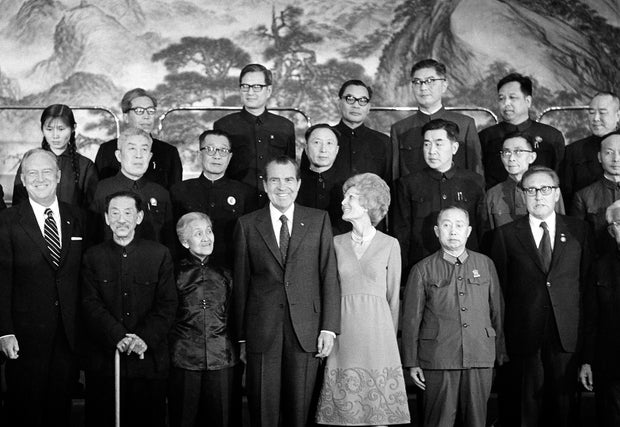

Nixon visits china broadcasted free#
He returned to that conviction in a second statement about the controversy, one that more forcefully articulated a commitment to free speech. But Silver’s avowed faith in the potential of the game to unite people was generally unremarked upon. The N.B.A.’s statement was widely criticized as an attempt to appease the Chinese government. expressed its displeasure with Morey’s tweet and Chinese television stations suspended broadcasts of Rockets games as well as preseason games that were set to be played in China. “We have great respect for the history and culture of China and hope that sports and the NBA can be used as a unifying force to bridge cultural divides and bring people together,” Silver asserted in the N.B.A.’s first statement after the C.B.A. Yao suggested that maybe it’s time to move to a larger ball.” Silver used similar language after a tweet posted by the Rockets’ general manager, Daryl Morey, earlier this month, expressed support for Hong Kong protesters, prompting an immediate backlash in China. “Yao reminded me of the famous Ping-Pong diplomacy forty years ago that was then current during that time.

“Sport has been used to bridge divides between cultures,” Silver said after a meeting, last year, in Shanghai, with Yao, who is now head of the Chinese Basketball Association. has become China’s most popular sports league, and the league has embraced the notion that it might facilitate a closer relationship between the two countries. In the two decades since Yao was drafted, the N.B.A. He added, “The Chinese will have to learn that.”īoth sides are still learning, clearly. “Americans will be Americans,” a senior official travelling with the team said. Track and Field team at a formal banquet in 1975, which appalled the hosts. In a recent column in the Washington Post, Pete Millwood, a fellow in East Asian history at the London School of Economics, catalogued some of the more sensational anecdotes: rats thrown by protesters when the Chinese team visited the United States a fistfight among the U.S. (Though Cowan’s boarding of the bus may have been accidental, he later said, “I was invited actually to board the Chinese bus with the team, which shocked me, of course.”) The two countries initiated several athlete exchanges over the next decade, with mixed success though the Chinese adopted the slogan “Friendship first, competition second,” tensions sometimes threatened to derail the visits. China was consciously using Ping-Pong as a way to initiate contact with the U.S., and the U.S. As Nicholas Griffin explains in “ Ping-Pong Diplomacy: The Secret History Behind the Game That Changed the World,” the encounter was not as spontaneous as it’s sometimes made out to be. games and content in 2017–18-more than six hundred million, roughly twice as many people as live in the United States.īut the truth, of course, is more complicated. draft to the enormous number of Chinese fans who reportedly streamed N.B.A. And you don’t have to stop there: you can, if you like, draw a line from “Ping-Pong diplomacy” to Nixon’s visit to China to Nike opening its first factory in mainland China, in 1981 to Yao Ming’s selection by the Houston Rockets as the No. The following day, Cowan presented Zhuang with a T-shirt emblazoned with a red, white, and blue peace sign and the words “Let It Be.” Soon afterward, China invited the American team to visit the country, and they became the first delegation of Americans to do so since the communist takeover in 1949.Īs a parable of the power of sports, the story is irresistible. Cowan rummaged around in his, looking for a way to reciprocate, but he could only come up with a comb. But after a few minutes Zhuang Zedong, a former world champion, came to the front of the bus and presented him with a gift, a silk-screen portrait of Huangshan mountain, which Zhuang had been carrying in his bag.

Most of the Chinese players watched him warily they had been warned not to talk to foreigners. Cowan, who was nineteen years old, had a mop of brown hair that fell to his shoulders and a toothy grin. In April, 1971, while practicing at the World Table Tennis Championship, in Nagoya, Japan, an American Ping-Pong player named Glenn Cowan needed a ride, and he boarded a bus carrying the Chinese team.


 0 kommentar(er)
0 kommentar(er)
